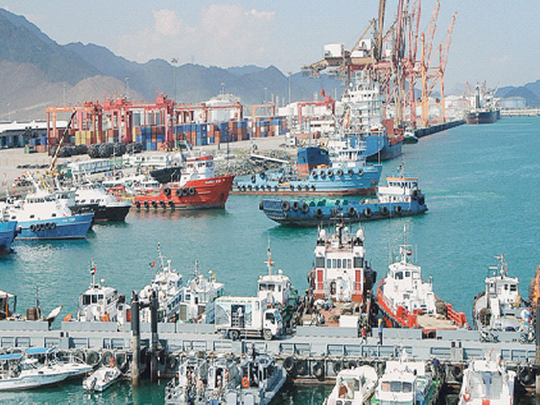
Abu Dhabi: Abu Dhabi is turning to more distant Fujairah to ensure safe, quick passage for its oil exports and improve the nation's food security.
The fourth-largest crude producer in the Organisation of Petroleum Exporting Countries is funding infrastructure projects in the easternmost emirate, Fujairah, to gain direct access to the Indian Ocean.
Abu Dhabi is investing in an oil-storage terminal and a $3.3 billion (Dh12.1 billion) pipeline and is building the country's biggest power and water treatment plants as well as a facility to store imported grain.
Iranian threat
The UAE's largest emirate is banking on Fujairah's location to bypass the Strait of Hormuz, a chokepoint at the mouth of the Gulf through which a fifth of the world's oil supplies move.
Iran has threatened to block the waterway if attacked because of its nuclear programme. In July, a Japanese tanker was bombed in the strait, heightening concern that energy supplies from the Gulf are insecure.
"Abu Dhabi is thinking long term and strategically," said Mustafa Al Ani, a regional security expert from the Gulf Research Centre, a Dubai-based institution.
"We've had about 60 statements from Iran in the last four years saying they would interfere with freedom of navigation in the Gulf or close the strait, so Abu Dhabi is now realising the value of Fujairah."
"There's no doubt Fujairah has a strategic location, being outside the strait, but let's say the threat of Iran wasn't there, we would still benefit," Sharif Al Awadhi, director-general of Fujairah Freezone Authority, said in an August 25 interview.
"It's better to put utilities here as the water intake is straight from the ocean. And it's safer as you reduce the number of ships you send through a single waterway."
Fujairah is a largely mountainous area where the main business of selling rocks, for land-reclamation projects such as Dubai's palm-shaped islands, was affected when the financial crisis stymied construction in much of the UAE. The emirate hopes now to strengthen its economy by becoming a centre for the trading, storage and transshipment of crude.
Bunkering port
Fujairah is already the world's third-biggest bunkering port, after Singapore and Rotterdam. Bunker oil is the main fuel used to power commercial ships, and the port hosts storage tanks owned by companies such as Royal Vopak NV and Vitol Group.
"Fujairah used to be just a hub for bunkering. Now, most of the storage tanks are for oil products," Salem Abdo Khalil, a technical adviser to the government, said in a September 5 phone interview from Fujairah. Storage capacity will more than double to 8.3 million cubic metres in 262 tanks by the end of 2012, from 3 million cubic metres in 121 tanks now, he said.
Some tanks are being built for Abu Dhabi National Oil Co, which will export half its crude from Fujairah starting next year. China National Petroleum Corp is building the 370- kilometre pipeline that will transport 1.5 million barrels of oil a day across the country's rugged interior. Abu Dhabi has the capacity to produce 2.7 million barrels of crude oil a day, more than 95 per cent of the UAE's total.
Possible refinery
Abu Dhabi Water and Electricity Authority built the country's biggest power and water plant, valued at $2.8 billion, in Fujairah. The utility will import natural gas from Qatar through a $418 million pipeline built by Dolphin Energy Co. The crude oil pipeline is funded by the International Petroleum Investment Co, a government-run fund that is also considering building a refinery in Fujairah.
Abu Dhabi is thinking of setting up a grain terminal for "time and safety reasons," Al Awadhi said.
In addition to avoiding what the US says is the world's most important bottleneck for oil supply, tankers will save time and money by loading and off-loading at Fujairah instead of having to sail more than 400 kilometres along the coast to Abu Dhabi.
Companies chartering a very large crude carrier could save $37,500 a day, according to data provided by London-based Drewry Shipping Consultants Ltd, based on the average one-year charter rate during August 16 to 27.
This will save buyers such as ExxonMobil Corp and BP Plc, partners in Abu Dhabi's onshore crude production, two days of sailing time.
"It still involves costs — pumping oil needs storage either end, and the pipeline will need maintenance and security in the desert," said Leo Drollas, deputy director of the Centre for Global Energy Studies, a London-based consulting firm. "With Iran's potential weapons, it's not like you can escape completely, but you can spread your risk."












